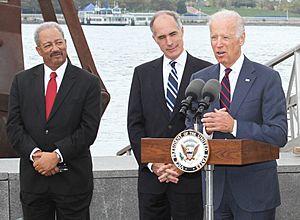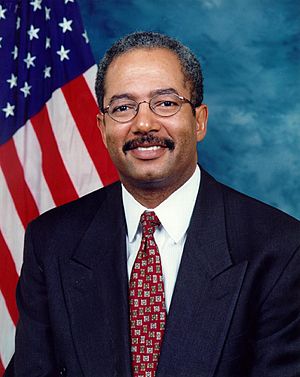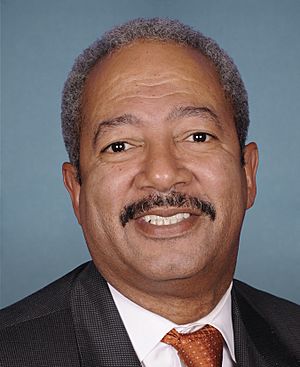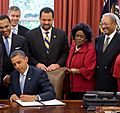Chaka Fattah facts for kids
Quick facts for kids
Chaka Fattah
|
|
|---|---|
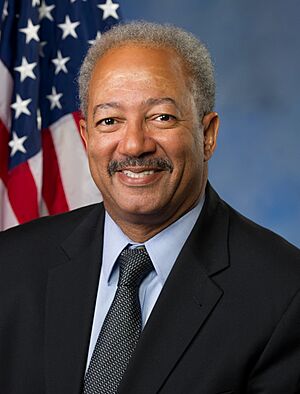
Official portrait, 2014
|
|
| Member of the U.S. House of Representatives from Pennsylvania's 2nd district |
|
| In office January 3, 1995 – June 23, 2016 |
|
| Preceded by | Lucien Blackwell |
| Succeeded by | Dwight Evans |
| Member of the Pennsylvania Senate from the 7th district |
|
| In office January 3, 1989 – August 31, 1994 |
|
| Preceded by | Freeman Hankins |
| Succeeded by | Vincent Hughes |
| Member of the Pennsylvania House of Representatives from the 192nd district |
|
| In office January 4, 1983 – November 30, 1988 |
|
| Preceded by | Nick Pucciarelli |
| Succeeded by | Louise Bishop |
| Personal details | |
| Born |
Arthur Wesley Davenport
November 21, 1956 Philadelphia, Pennsylvania, U.S. |
| Political party | Democratic |
| Spouse | Renee Chenault |
| Children | 4 |
| Education | Community College of Philadelphia University of Pennsylvania (BA, MPA) |
Chaka Fattah (born Arthur Wesley Davenport; November 21, 1956) is an American politician. He was a member of the Democratic Party. He served in the U.S. House for Pennsylvania's 2nd district from 1995 to 2016. This district included parts of North Philadelphia, South Philadelphia, and West Philadelphia. It also covered Lower Merion Township in Montgomery County. Before this, he worked in the Pennsylvania Senate and the Pennsylvania House of Representatives.
However, Chaka Fattah faced legal challenges and was found responsible for certain actions. This led to his resignation from Congress in 2016. He spent some time in prison and was released in 2020.
Contents
Early Life and Education Journey
Arthur Davenport was born and grew up in Philadelphia. He was the fourth of six sons born to Russell and Frances Davenport. His father was a sergeant in the United States Army. His mother was an editor for the Philadelphia Tribune newspaper.
His parents divorced when he was young. His mother later remarried. After a conference in 1968, his mother and her new husband changed their family name to Fattah. They also changed Arthur's name to Chaka, after a Zulu king. His mother and stepfather were very active in their community. Their social work greatly influenced Chaka Fattah's interest in politics.
His adoptive father, David Fattah, and mother, Falaka Fattah, are community leaders in West Philadelphia. They created an organization called the House of Umoja. They work to build a safe place for young people.
Schooling and Advanced Degrees
Fattah went to Overbrook High School. He also attended the Community College of Philadelphia. He earned a Bachelor of Arts degree in business and economics from the University of Pennsylvania. He is a member of the Alpha Phi Alpha fraternity.
In 1984, Fattah completed a special program for government leaders at Harvard University's John F. Kennedy School of Government. In 1986, he earned his master's degree in government administration. This degree was from the University of Pennsylvania's Fels Institute of Government.
Chaka Fattah received many awards and honors. He earned 10 honorary doctorates. He also received the Distinguished Alumni Achievement Award from the University of Pennsylvania's Fels Institute of Government. Time magazine once named him one of the 50 most promising leaders in the country.
Serving in Pennsylvania's State Legislature
Chaka Fattah began his political career in Pennsylvania. He served in the Pennsylvania House of Representatives. He represented the 192nd district from 1983 to 1988.
After that, he became a State Senator. He represented the 7th district from 1988 to 1994.
Supporting STEM Education
In 1987, Fattah started the Graduate Opportunity Initiative Conference. This is an annual event that lasts three days. It provides information and scholarships. The goal is to help more students from under-represented groups enroll in graduate programs. These programs focus on Science, Technology, Engineering, and Math (STEM fields). The conference was created to encourage minority students to study STEM subjects in college and beyond.
Work in the U.S. House of Representatives
Chaka Fattah served in the United States House of Representatives from 1995 to 2016. He represented Pennsylvania's 2nd district. This district was known for being strongly Democratic.
Congressional Elections
In 1991, State Senator Fattah ran for the U.S. House seat in Pennsylvania's 2nd congressional district. This was a special election. It happened after Congressman William Gray resigned. City Councilman Lucien Edward Blackwell won that election. Fattah came in second place.
In 1994, Fattah ran against Blackwell again in the Democratic primary election. This time, Fattah won with 58% of the votes. He then won the general election with 86% of the votes. After that, he was re-elected every two years. He always won with at least 86% of the votes. He was not challenged in the Democratic primary until 2016. In that election, he lost to Dwight E. Evans.
Key Initiatives and Focus Areas
During his time in Congress, Fattah worked on several important issues. He focused on education, youth mentoring, and scientific research.
Advancing Education Opportunities
Fattah was a key person behind the Gaining Early Awareness and Readiness for Undergraduate Programs (GEAR UP). This program helps students prepare for college. Since it started, over $4 billion in federal money has been given out. This has helped 12 million students across all 50 states and U.S. territories.
Fattah also supported the American Dream Accounts Act. This bill would create online accounts for students. These accounts would help them track their progress toward higher education. They would also include a college savings account. The bill aimed to help low-income students plan for college.
He introduced the "Student Bill of Rights" in 2002. This bill asked states to provide good teachers and early childhood education. It also called for fair resources for all public school students.
Fattah also wrote the law for the American Opportunity Tax Credit (AOTC). This tax credit helps college students and their families. Since 2011, it has helped 4.5 million students. The AOTC provides up to a $2500 tax credit. This helps families pay for college costs.
Outside of his work in Congress, Fattah created local education programs. One example is the CORE scholars program. This program has provided almost $27 million in scholarships. It has helped over 18,000 students. The program also helps families apply for financial aid.
Supporting Youth Mentoring Programs
Fattah played a big role in funding youth mentoring programs. He helped increase funding for groups like the Boys & Girls Clubs of America. He also supported Big Brothers Big Sisters of America.
In 2012, Fattah helped create a partnership. This partnership was between FIRST and Boys & Girls Clubs of America. It aimed to bring robotics programs to 4 million young people.
Promoting Neuroscience Research
Fattah was a leading Democrat in funding major science agencies. These included NASA and the National Science Foundation (NSF). In 2011, he helped create the Interagency Working Group on Neuroscience (IWGN). This group works within the White House. It makes recommendations for future neuroscience research.
The Fattah Neuroscience Initiative is a policy idea. It aims to make big progress in understanding the human brain. It does this by bringing together federal research efforts. It also encourages partnerships between public and private groups.
Focus on Manufacturing and Business
Fattah believed it was important for small and medium businesses to succeed. He worked to ensure they had the tools to compete globally. He supported funding for the Manufacturing Extension Partnership. This program helps manufacturers create jobs and increase profits. He also supported the SelectUSA program. This program encourages U.S. businesses to operate in the U.S.
Advocating for Cooperatives
Fattah was a strong supporter of cooperative businesses. In 2013, he introduced the Creating Jobs through Cooperatives Act. This law would help start new cooperatives. It would also provide tools and training for entrepreneurs. His bill called for a $25 million federal investment. This money would go to a new National Cooperative Development Center.
Key Legislation Sponsored
As a state representative, Fattah wrote a law called Pennsylvania's Homeowners Emergency Mortgage Assistance Program (HEMAP). This program helps Pennsylvanians who are struggling to make mortgage payments. It provides loans to prevent people from losing their homes. In 2010, Fattah added similar ideas to a national bill. This helped create a program to assist homeowners across the country.
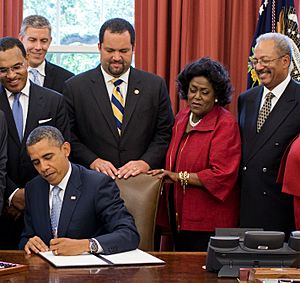
In 2013, Fattah was a vice chair on the House Gun and Violence Taskforce. This group worked on issues related to gun control. Fattah supported programs that allowed people to exchange firearms for vouchers. These programs aimed to reduce gun violence in Philadelphia.
Fattah also introduced a bill called the "Transform America Transaction Fee." This bill suggested studying a 1 percent fee on financial transactions. He believed this could bring in a lot of money. This money could then be used for things like healthcare and education. However, this bill did not become law.
In 2005, Fattah was against the War in Iraq. He supported bringing troops home from Iraq.
Committee Roles in Congress
While in the U.S. House, Fattah served on important committees:
- Committee on Appropriations
- Subcommittee on Commerce, Justice, Science, and Related Agencies (Ranking Member)
- Subcommittee on Energy and Water Development
2007 Philadelphia Mayoral Campaign
In November 2006, Chaka Fattah announced he would run for Mayor of Philadelphia. The current mayor, John F. Street, could not run again. Fattah emphasized his plan for better education for young people. He spoke next to the Microsoft's School of the Future.
Fattah came in fourth place in the Democratic primary election. Michael Nutter won that election and later became mayor.
Later Career and Brain Research Focus
In December 2016, Fattah started a consulting firm. It is called Fattah Neuroscience Global Advisors (FNGA). This firm works with universities, non-profits, and companies. Its goal is to advance brain science and research around the world.
Fattah was known for his focus on neuroscience research in Congress. He served as the Ranking Member of the United States House Appropriations Subcommittee on Commerce, Justice, Science, and Related Agencies. He championed the Fattah Neuroscience Initiative. This initiative encouraged the White House Office of Science and Technology Policy to find ways to speed up the development of new treatments for brain diseases.
In January 2022, FNGA announced a partnership with the Brain Wellness Initiative of Africa. They plan to work together to improve brain research in Africa. They also aim to help African brain scientists gain global recognition. Since 2021, FNGA has hosted online forums about brain research.
Fattah also serves as Chairman of the National Brain Council. This group works to increase federal funding for brain research.
Personal Life and Family
Chaka Fattah is married to Renee Chenault-Fattah. She was a television news broadcaster in Philadelphia. They have one daughter, Chandler Fattah. He is also a stepfather to her daughter, Cameron Chenault. Fattah has another daughter, Frances, and a son, Chaka Fattah Jr.
In 2002, he was recognized for his good sense of style.
Images for kids
 | Madam C. J. Walker |
 | Janet Emerson Bashen |
 | Annie Turnbo Malone |
 | Maggie L. Walker |


